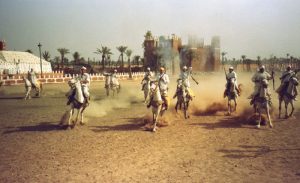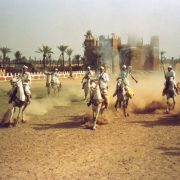Book 2: Chapter 4
The Art of Staying ALIVE

A fellow sailor, my good friend Gil, and I put in our request to take one week off. Once we secured it, the countdown to paradise began. It was going to be a big journey, more than what it appeared on the surface. I felt like we were leaving our childhoods behind: No more lights out at ten,
Morocco, Marrakech: Fantasia Berber Horsemen
No more homework – total freedom! We’d be drinking and laughing. Our plan was to rent a car and drive across the Sahara Desert, staying at air force bases such as Benguiro. For a couple of nineteen-year-olds, it was an amazing adventure, dangerous and thrilling, and the reward would be a sight I’d been looking forward to my whole life. One I’d never forget.
Things got off to a rough start. Sailors are required to travel three at a time or risk the brig, but our third didn’t show up and we weren’t about to wait or blow the trip altogether.
We tore through the Sahara at about eighty-five miles an hour, sun baking down, the highway seemingly abandoned for miles ahead and behind us. Despite our loss of a third travel companion, things were looking good for an incredible weekend.
Then a small dot appeared on the horizon, small and hard to discern. Neither Gil nor I gave it very much thought. As it got closer it was clear to us both it was another car on the road coming at us in the opposite direction.
Gil guessed, “Must be one of us?” I could only shake my head. As the car got closer, I had a bad feeling. A little shape poked out of the driver’s side window, my fears echoed with shame. “It is,” Gil said, “see, he’s waving.”
He wasn’t one of us, and he wasn’t waving. And it was only as we raced up to the other car, a red pickup truck, that I realized what the driver was really doing.
The brick flew out of the driver’s hand before I had a chance to swerve, the rectangular projectile flew into our windshield with all the speed and momentum of the passing car colliding with the opposing trajectory of our own.
The combination was more than enough to shatter the windshield.
I swerved, unable to see. We almost sped over the shoulder and into a ditch, tires skidding beneath us as I wrestled the car to a blind stop. We pulled over to the side of the road and got out, ready for an altercation, but our attackers drove on behind us, content to have struck a blow against the occupying forces.
There was still the car to deal with, which was now going to be almost impossible to drive. Gil and I tried to kick in and then push out the shattered windshield, held together by a film over the glass to prevent it from shattering.
Gil asked, “Now what?”
“Dunno,” I said, glancing up and down the road. “But I’m not missing that festival, I can tell you that.”
We finally managed to dislodge the useless, shattered glass and drive the rest of the way with an open windshield, catching more than our share of bugs in our teeth before finally arriving at the nearest Air Force base. We’d spend the night there and push on to Marrakesh the next day.
The biggest event of the year had drawn tourists from all corners of the globe; innumerable Asian extractions, Europeans looking blankly around as if deliberately unimpressed. Gil and I braced ourselves as we parked and pushed into the crowd on foot. The air was thick with the smells of fine hash, foul body odor, the hot juicy scent of grilled lamb. The clamor of a thousand conversations buzzed in my ears, dizzying.
Hundreds of Moroccan horsemen rode with grim faces, postures stiff and rigid, their procession filling a wide, flat area. Gil and I jostled to keep up and not lose each other while still getting a good spot to take in the action to come.
Fantasia, also known as lab Al baroud or the gunpowder play, celebrated the bond between man and horse and, strangely, was and remains often performed at weddings among the Berber people and in the Maghreb. Often thought of as a military exercise, the Fantasia featured a group of riders, or serba, dressed in their elaborate garb and carrying old-world rifles called moukahla. They rode in stately procession to the tapping of drums, bathed in light.
The horses, a breed called barb, were known for their speed and courage, though this ritual required them to carry their riders with control and discipline. The horses themselves seemed to know their role, after generations of ritualistic performance ingrained in their muscles, their tissues, and down to their very bones.
Tensions rose, intensity gathered, until the horsemen all raised their rifles and executed what sounded like a single, incredible shot ringing out over Marrakesh. Their timing was perfect, not a single man even a fraction off of the others. Coming from the chaotic, individualistic United States but trained in the disciplined ways of the armed services, I couldn’t help but be impressed at their sense of unity and tradition, honoring the generations who had come before them and knowing that future generations would do the same. It was so like the ethos which drew us together as that one percent who serve in the military, who were and will always be ready to lay down that last measure of devotion to duty and honor to their country. That seemingly single shot rang in my gut, heart, and soul, making my whole body tremble.
It was more than just the idea of reconnecting with my fellow sailors, with the men and women in any branch of service. Watching this ceremony, available in its authenticity nowhere else in the world, was an honor, a reward afforded to me by my risk, by my ambition. We’d broken rules to attend the ceremony, but the rules of the base no longer seemed to apply. It was as if I was no longer in their service, in their world or in my own. I felt as if I’d stepped into the past, into a storybook, a page straight out of One Thousand and One Arabian Nights. This was why I had joined the armed services; to see parts of the world I could never see otherwise, do things I’d never be able to do.
And Fantasia had been at the top of the list.
Gil and I weaved through the thinning crowd to one of the many sidewalk cafes along the streets of Marrakesh.
“Why’d you come to Morocco?” I asked. Gil gave it a little thought as we arrived under a promising sign reading The Blue Parrot. “I guess the sand is always browner on the other side.”
The Blue Parrot was packed, but we managed to find a spot in the corner. The beers were cold, fast and cheap; and they went down with a bit too much vigor.
“Y’know, we’re here to help these people,” I said. “It’s our job, our duty, our mission!”
“No,” Gil said with a drunken sway in his voice, “it’s our mission to secure the liberty of the United States of America — ”
“No, Gil. As sailors, as soldiers, as any member of the armed services, we have two jobs: to obey, and to fight.”
Gil finished his beer. “Sounds like the Boy Scout pledge. And I get it, I really do. And I admire it … sort of. But you gotta let go of those schoolboy thoughts and open up your eyes; wars are good for one thing only, and that’s to make money. Big scale and little, from the billions in arms contracts to the thousands of people who skim off the black market, it’s all just a big scam.” He glanced around. “But I don’t wanna get killed out here just so some Washington dick can get rich.”
I raised my beer and tried to smile. “God bless America.”
“You’re damn right!”
After a few too many more, we staggered out of The Blue Parrot onto the streets of Marrakesh. We shambled up to the first hotel we found, not even bothering to read the sign.
Once at the reception, the hotelier told us that he didn’t have a room, a bed, or even a staircase we could rent. The way he smiled as we stepped out to our next disappointment, I knew things weren’t going to get much better.
I asked Gil, “Why didn’t you book us a room?”
“Me? This whole Fantasia thing is your deal, not mine. Where was Mickey Mouse, anyway?”
“I got the car, Gil. It was your job to get us a room.”
“Who needs a room? We just stay up and party, then sleep on the bus on the way home.”
“We don’t leave for another two days! We’ll never get a room now, forget it.”
“So we’ll camp out! There must be a public park around here somewhere.” Gil glanced around, but he began to swerve and teeter, barely able to remain on his feet.
“Excuse me, gentlemen?” We turned to see a local, identifiable as Moroccan by his colorful garment known as a jellaba, stepped toward us with a broad smile, arms extended, hands empty. “Did I take it that you have no place to stay for the night?”
Gil took a step back and looked the man up and down.
I was quick to say, “We didn’t make reservations in time, that’s correct.”
“My house is not far,” he said in that thick Moroccan accent. “My family would be honored to have you as our guests.”
Gil turned his head as if to get a better view of the man. “Why?” he said frankly.
The Moroccan just glanced at our uniforms, which we’d forgotten still won us some modicum of respect. Gil and I shared a suspicious glance, and I knew what would be best for us all. I wasn’t sure what Gil was capable of, but even more so I wasn’t sure who this man was or where he could be leading us.
Not everybody respected the good ol’ Stars & Stripes, after all.
“That’s very kind of you,” I said, “but we don’t want to be a bother. We’ll find something out here.”
“No, no, no, sir, please,” the Moroccan said, “I couldn’t live with myself to abandon you to the streets of Marrakesh. You have helped us in so many ways, I insist you offer my family the chance to properly thank you.”
“Damn right,” Gil said with a bad tone, carrying him away and me along with him.
“Gil?”
“What? He’s right, they owe us!”
I couldn’t help but roll my eyes and shake my head, our would-be host smiling at my discomfort. “Can you still drive?”
“I can,” I said, looking Gil up and down. “I’m not sure about my friend here.”
The Moroccan nodded. “I’ll take you to your car and you can follow me to my house.”
With that, both Gil and I knew that each step was taking us closer and closer to a future that was both mysterious and very likely to be beyond our control.
We pulled up to a little square building, much like those on either side. The Moroccan pulled up with his buddy and Gil and I pulled up to park behind them. Our new host and his friend consulted in quiet, one running quietly into the house while our guest approached us in a hushed voice.
“I’ll let my wife know you’ll be staying,” he said, as he turned to my car window. We were deep into what’s known as the Jewish Media, and we were restricted from being there, but with no room at the inn, as they say, we figured any port in a storm was better than none at all.
The Moroccan followed his friend into the house and Gil and I could only share a glance and shrug. We looked around, the desert night becoming suddenly chilly. We sat back in the seats of the Renault to await our welcoming host, both of us looking forward to a cozy night indoors.
I woke up behind the wheel of the Renault, shocked, my senses all bursting to life at once. What happened, what’s going on? But there was no time. The Renault was being jostled, Gil and I looking around to see a group of six or seven Arab men, wrapping and kicking the car, sabers out.
“Start the car,” Gil said, “get us outta here!”
I cranked the key, the ignition failing to turn the engine over. “I’m trying, it won’t start!”
The engine finally turned over and the car jumped forward, nearly smashing into the parked car in front of us. The Arabs jumped back as one finally pulled Gil’s door open. Gil pulled his foot back and kicked the guy away from the door just as the Renault jumped forward, rubber peeling on the road.
The car sped off, wiggling on the road just a bit before I could get a bite on the asphalt. In the rearview mirror, the other Arabs had gotten dangerously close, to within a few yards, but they were disappearing fast as I sped off, back toward the Air Force base and to safety.
“Hey,” I said to him once we were clear, “easy on the slurs, right?”
Gil gave it some thought, then nodded, glancing back once more at the murderous band vanishing behind us. “Sure thing, boy scout,” chucking and panting with his relief just to be alive, “whatever you say.”
We were excited to share our near-death experience with the other sailors once we got back to our base, admonishing them never to go out with less than three troops.
“Sounds like they almost got ‘cha,” one sailor said back in the barracks.
I shrugged, keeping it casual. “It wasn’t great,” I said, downplaying it, “it wasn’t quite as bad as that chemical truck fire when I was sixteen.” I have to admit, I enjoyed their shocked, impressed expressions; eyes wide, mouths low and hanging open. “Oh yeah,” I added, “then there was that time with my kid brother … ” But all bragging rights aside, the true horrors of my past came back to me with blood-curdling clarity, as they did so often in my dreams. I didn’t want to go into the episode that happened in the desert back home, when I was just eleven, or the out-of-body experience I had six years before that. It was too complicated, too ugly, and there was too much to think about besides all that. I was in my youthful prime, living an adventure most people wouldn’t dare dream about.
It was too hard not to be excited about how thrilling it all was, about how colorful and enthralling the Fantasia had been. I had to admit, it lived up to my every expectation and much more, and though it nearly cost me my life, I have to say that I would do it all again in an instant. There would be other adventures, hopefully not so dangerous but just as thrilling.
I was just getting started, and things were really about to heat up.



